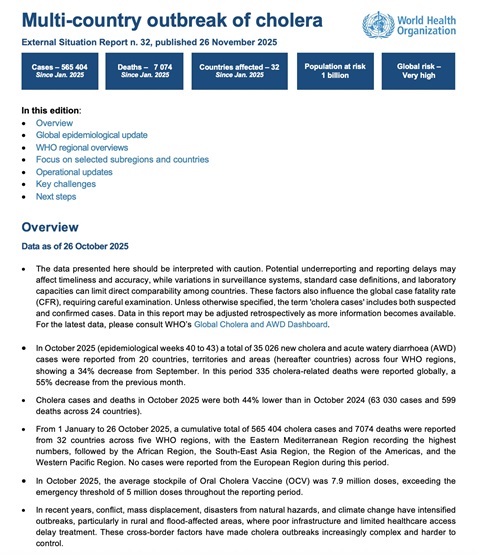From Smoking Cessation to Diabetes Care: Babul’s Pharmacist-Led Research Shapes Patient Outcomes – Pharmacy Times

Report on Pharmacist-Led Research and its Contribution to Sustainable Development Goals
Executive Summary: Aligning Pharmaceutical Practice with Global Health Objectives
This report details the research initiatives of Nazia Somani Babul, PharmD, BCACP, a clinical assistant professor and pharmacist whose work exemplifies the integration of pharmaceutical practice with the United Nations Sustainable Development Goals (SDGs). Her research, centered on underserved and low-income populations, directly contributes to SDG 3 (Good Health and Well-being) and SDG 10 (Reduced Inequalities) by developing and validating models of care that improve health access and outcomes for vulnerable communities.
Core Research Initiatives and Impact on SDG 3
Dr. Babul’s research portfolio focuses on critical non-communicable diseases and wellness, directly addressing targets within SDG 3.
- Smoking Cessation Programs: In alignment with SDG Target 3.a (strengthen the implementation of the WHO Framework Convention on Tobacco Control), studies demonstrated that providing underserved patients with access to nicotine replacement therapy alongside counseling significantly increased smoking cessation rates compared to counseling alone.
- Diabetes Self-Management: A key publication focused on optimizing care for patients with diabetes, a direct contribution to SDG Target 3.4 (reduce premature mortality from non-communicable diseases). The research supported a protocol allowing pharmacists to manage orders for blood glucose and insulin supplies, advocating for policy changes that expand pharmacists’ roles to ensure timely access to essential self-management tools, which also supports SDG Target 3.8 (achieve universal health coverage and access to essential medicines).
- Holistic Wellness Counseling: Current research explores patient outcomes from wellness counseling visits covering eight dimensions of wellness. This initiative promotes a comprehensive approach to health, contributing to the broader objective of promoting well-being for all under SDG 3.
Fostering Education and Partnerships for Sustainable Development (SDG 4 & SDG 17)
The operational framework of Dr. Babul’s research emphasizes collaboration and education, reflecting the principles of SDG 4 (Quality Education) and SDG 17 (Partnerships for the Goals).
- Collaborative Research Model: As a primary or co-investigator, Dr. Babul consistently works with a team of pharmacist colleagues, pharmacy students, and residents.
- Educational Integration: This model provides learners with direct experience in research design and implementation, enhancing the quality of pharmaceutical education and building capacity within the next generation of healthcare professionals (SDG 4).
- Knowledge Dissemination: A significant accomplishment cited is the sharing of research findings at professional conferences. This practice fosters a robust exchange of knowledge and best practices among pharmacists, strengthening partnerships and collective action to improve patient care services globally (SDG 17).
Advocacy for Systemic Change to Reduce Health Inequalities (SDG 10)
A central theme of the research is its application to drive policy and practice changes that reduce systemic barriers to healthcare, a core tenet of SDG 10 (Reduced Inequalities).
- Expanding Scope of Practice: The research on diabetes management explicitly recommends amending state practices to support an expanded scope for outpatient pharmacists.
- Improving Access for Vulnerable Groups: By empowering pharmacists to manage essential supplies, the proposed changes would significantly improve timely access for low-income patients and those served by free clinics, directly addressing health disparities.
- Strengthening Health Systems: This work contributes to building more resilient and equitable health systems by optimizing the roles of accessible healthcare professionals like pharmacists to better serve marginalized communities.
Analysis of Sustainable Development Goals in the Article
1. Which SDGs are addressed or connected to the issues highlighted in the article?
The article primarily addresses two Sustainable Development Goals (SDGs) through its focus on improving healthcare access and outcomes for vulnerable populations.
- SDG 3: Good Health and Well-being: The core of the article revolves around research aimed at improving patient health. This includes studies on smoking cessation, diabetes self-management, and wellness counseling, all of which are central to ensuring healthy lives and promoting well-being.
- SDG 10: Reduced Inequalities: The research and clinical services described are explicitly targeted at “underserved and low-income populations.” By focusing on improving health outcomes for these specific groups, the work directly contributes to reducing health inequalities.
2. What specific targets under those SDGs can be identified based on the article’s content?
Several specific targets under SDG 3 and SDG 10 are relevant to the initiatives discussed in the article.
-
SDG 3: Good Health and Well-being
- Target 3.4: By 2030, reduce by one third premature mortality from non-communicable diseases through prevention and treatment and promote mental health and well-being. The research on “optimizing diabetes self-management” and improving “smoking cessation rate[s]” directly addresses the prevention and treatment of major non-communicable diseases. The work on “wellness counseling” also aligns with promoting well-being.
- Target 3.8: Achieve universal health coverage, including financial risk protection, access to quality essential health-care services and access to safe, effective, quality and affordable essential medicines and vaccines for all. The article highlights work at a “free clinic for underserved patients” and efforts to provide “access to OTC nicotine replacement therapy” and “timely access to self-management supplies” for diabetes, which are clear examples of improving access to essential healthcare services and medicines for vulnerable populations.
- Target 3.a: Strengthen the implementation of the World Health Organization Framework Convention on Tobacco Control in all countries, as appropriate. The study showing that providing nicotine replacement therapy alongside counseling led to a “higher smoking cessation rate” is a direct contribution to implementing effective tobacco control measures.
-
SDG 10: Reduced Inequalities
- Target 10.3: Ensure equal opportunity and reduce inequalities of outcome, including by eliminating discriminatory laws, policies and practices and promoting appropriate legislation, policies and action in this regard. The article mentions advocating for policy changes, specifically “amending state practices to support this expansion of services for outpatient pharmacists.” This action is aimed at changing policies to reduce inequalities in patient access to care and improve health outcomes for all, particularly those with diabetes.
3. Are there any indicators mentioned or implied in the article that can be used to measure progress towards the identified targets?
The article implies several specific, project-level indicators that can be used to measure progress towards the identified targets.
- Smoking Cessation Rate: The article explicitly states that one study showed a “higher smoking cessation rate” in patients who received nicotine replacement therapy and counseling. This rate is a direct indicator of progress for Target 3.4 (treating non-communicable diseases) and Target 3.a (tobacco control).
- Access to Essential Supplies and Medicines: The provision of “access to OTC nicotine replacement therapy” and ensuring patients have “timely access to self-management supplies” for diabetes are indicators of improved access to essential healthcare, relevant to Target 3.8.
- Implementation of Pharmacist-Led Protocols and Policy Changes: The successful use of a “protocol that allowed outpatient pharmacists at UI Health to enter and modify orders” and the recommendation for “amending state practices” serve as indicators for Target 10.3. They measure the implementation of new practices and policies designed to reduce inequalities in healthcare access.
- Patient Outcomes in Wellness Counseling: The current research to “assess patient outcomes of providing wellness counseling visits” and identify which dimensions of wellness patients are most interested in improving can serve as an indicator for promoting well-being under Target 3.4.
4. Table of SDGs, Targets, and Indicators
| SDGs | Targets | Indicators (as identified in the article) |
|---|---|---|
| SDG 3: Good Health and Well-being | 3.4: Reduce premature mortality from non-communicable diseases and promote mental health and well-being. |
|
| SDG 3: Good Health and Well-being | 3.8: Achieve universal health coverage and access to quality essential health-care services and medicines. |
|
| SDG 3: Good Health and Well-being | 3.a: Strengthen the implementation of the WHO Framework Convention on Tobacco Control. |
|
| SDG 10: Reduced Inequalities | 10.3: Ensure equal opportunity and reduce inequalities of outcome by promoting appropriate legislation and policies. |
|
Source: pharmacytimes.com
What is Your Reaction?
 Like
0
Like
0
 Dislike
0
Dislike
0
 Love
0
Love
0
 Funny
0
Funny
0
 Angry
0
Angry
0
 Sad
0
Sad
0
 Wow
0
Wow
0














































































